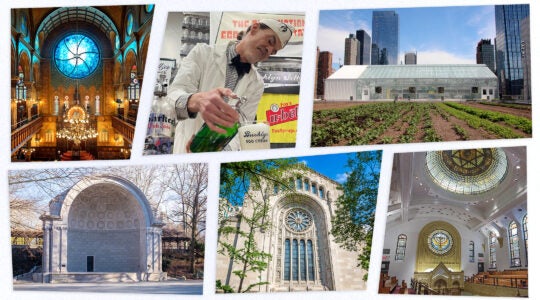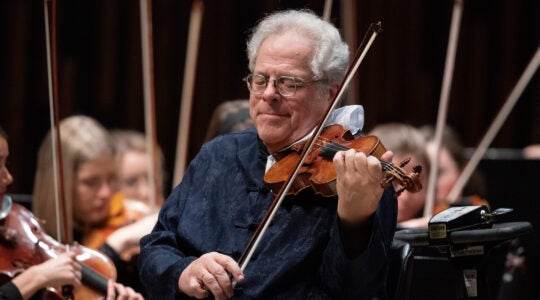Perhaps it was inevitable that in Brooklyn’s small community of Orthodox black Jews, Yoseph Robinson and Lahavah Wallace would eventually meet.
It happened via Facebook, through mutual friends, and then the two learned that they only worked a few blocks from each other in Midwood: he at a kosher liquor store on Nostrand Avenue near Avenue J and she at a nearby law firm.
Several weeks ago Wallace began to visit Mr. Robinson during lunch breaks, and before long they were inseparable.
“When you click with someone, you want to be with him as much as possible,” said Wallace. “We would buy lunch together, then talk on the phone and after work we hung out and ordered dinner.”
As almost anyone who met him was, Wallace was impressed with Robinson’s multi-tiered journey from a poor kid in Spanish Town, Jamaica, to self-described drug dealer to successful hip-hop impresario in California, to a much more humble life as a convert to Orthodox Judaism in Brooklyn 11 years ago.
There, he worked as a clerk at MB Vineyards during the day and studied Torah nights and mornings. On weekends, he enjoyed the warm hospitality of an Orthodox community in Flatbush and elsewhere that saw inspiration in the way Mr. Robinson found a sense of shelter and renewal in their traditions.
“It was truly a Kiddush Hashem,” said Rabbi Kenneth Auman of the Young Israel of Flatbush, where Mr. Robinson often worshipped, using the term for sanctification of God’s name. “He ate at my house often, and others’ houses, and was often called for aliyahs,” the honor conferred during the Torah reading.
Wallace said that although some Jewish African Americans, as a minority within a minority, find they are subject to awkward stares and “people saying silly things” and often struggle to feel accepted, Mr. Robinson appeared to face no such barriers.
“Without a doubt, this was his comfort zone,” she said.
Wallace was one of several people working with Mr. Robinson to complete and market his memoir. Last week she sent an e-mail to The Jewish Week encouraging a story about his life. But by the time it was seen by an editor, Mr. Robinson was already in the news, having been gunned down at his workplace on Aug. 19 in an apparent botched robbery attempt. Wallace was in the store at the time.
Police on Aug. 26 charged Eion Klass, 33, who lives a few doors down from the store, with the crime based on tips from informants. He faces first degree murder and weapons possession charges. Sources told The Daily News that Klass knew Robinson, who has a prior record for attempted murder and robbery, and that desperate financial straits may have compelled him to commit the 9:30 p.m. holdup.
Mr. Robinson “was a kind person, the kind who always helped others,” Wallace said in an interview Monday, a few hours before the funeral.
True to form, Mr. Robinson died while performing one last act of helping, having lunged twice at the gunman to defend Wallace from the robber. The second time, police said, the assailant opened fire, hitting him in the chest and arm. Wallace was at his side as paramedics arrived to rush him to Kings County Hospital. He died with no final words.
“He was just trying to breathe,” she said.
It wasn’t Mr. Robinson’s first brush with violent crime. He was shot at age 19, in an act of betrayal by a close friend, he recalled on a recent interview with Talkline radio host Zev Brenner.
“I got shot by a close friend,” he told Brenner. “I almost died. In fact, a person who was with me did die.” It was one of the reasons he decided to turn his life around. “I decided to abandon ship, if you may. If a close friend was able to [almost] kill me, that might not be the best way to spend my life.”
Mr. Robinson, whose given name was Chester, had been raised by his grandmother in Jamaica while his parents tried to make it in America. His mother worked for a Jewish family who sponsored the family’s immigration. Mr. Robinson joined his parents in Brooklyn in 1989, at the age of 12. He dropped out of school at 16 and the drug trade took him to the Bronx, Philadelphia and eventually Los Angeles.
After his brush with death, he said in the radio interview, “I was looking for something legitimate to get into,” and he founded a successful hip-hop record label. But when that didn’t fill the void he felt in his life, he wandered into a religious store in a heavily Jewish area of the San Fernando Valley that turned out to be a Judaica shop. When he asked for a Bible, he got the Sampson Raphael Hirsch edition of the Chumash. And so began his journey to Judaism “as a means to surrender control, accept humility, and educate,” he wrote on his website (http://yosephrobinson.com).
In an interview with The Jewish Press in June, Mr. Robinson said his transformation came as a shock to those around him.
“When I decided to convert, my friends thought I went off the deep end, and my family tended to agree with them,” he told the Orthodox weekly. “After realizing that my decision was a serious, lifelong commitment, however, I did garner the respect of those closest to me."
The conversion took place under the auspices of the Los Angeles beit din, under Rabbi Tzvi Block and Rabbi Aharon Tendler, Mr. Robinson told the Jewish Press. “My geirus [conversion] studies program took about two-and-a-half years to complete, and centered on the weekly parshah, the halachos of Shabbos and kashrus, and the [613] mitzvos.” He married and had a daughter but was divorced before recently moving to Brooklyn.
Brenner, who was to rebroadcast his June interview with Mr. Robinson on his Wednesday night show, was so impressed with the story he invited Mr. Robinson to Long Beach, L.I., where he spends summers, on what would be Mr. Robinson’s final Shabbat.
Mr. Robinson left a trail of inspiration and fond memories as he retold in private conversations and a lecture to the Young Israel of Long Beach the tale of his conversion.
“It obviously transformed his life,” said Dovid Steinberg, a shul member who hosted Mr. Robinson for Friday night dinner. “He was basically a high-level drug dealer with everything that attends to that and was obviously making lots of money. And so he told the story of how at a certain point he felt sick at what was happening in his life.”
Steinberg said he has volunteered to recite Kaddish for Mr. Robinson, who has no Jewish relatives. “I felt that we had made a new friend who was a very special person,” said Steinberg. “As a former public school teacher I can relate to his story. I taught many students who came from where he’s coming from. He told me he didn’t even get to high school. He was a proud Jew, a ger tzedek [righteous convert] and a wonderful ambassador of Judaism to the world, and we need that.”
Brenner recalled that during Mr. Robinson’s presentation at the Young Israel of Long Beach, in which he revealed that he had one Jewish grandparent, the shul’s custodian, who joined the discussion, asked why he gave up the money he was making in the recording industry to work as a clerk in a liquor store in Brooklyn.
Mr. Robinson’s answer, according to Brenner, was “I was kidnapped by God.”
On Monday night, an overflow crowd gathered at the Shomrei Hadas funeral home in Borough Park for the service as hundreds of people whose lives had been touched by Mr. Robinson gathered to pay their respects.
They included Danielle Schnur, who works in public relations and was helping Mr. Robinson edit his memoir, and would often stop into MB Vineyards to chat with him about life and basketball. “He was a very fine soul who has led many different lives,” said Schnur. “He was someone who really turned his life around.”
A $12,000 reward has been posted by police for information about the case. Community members and politicians are working to raise additional funds. Mr. Robinson’s body was to be flown to Jamaica Tuesday for burial.
Wallace said she is holding onto memories and trying to be strong. “One of the things Yoseph would tell me is to be strong and confident. He only knew me for a month and yet he trusted me to publicize his book. I have to live up to how he felt about me.”
The gunman, she said, “took away a beautiful neshama [soul] and doesn’t even know it.”
In a video posted on his website, wearing a dark suit and black hat and standing in a beit midrash, Mr. Robinson said he was proud of his transformation.
“When I was bad, I was bad,” Mr. Robinson says. “Now, I’m trying my best and I’m a much better boy than I was back then. Hopefully, some of the things I have done, I will be forgiven for.”
The New York Jewish Week brings you the stories behind the headlines, keeping you connected to Jewish life in New York. Help sustain the reporting you trust by donating today.




